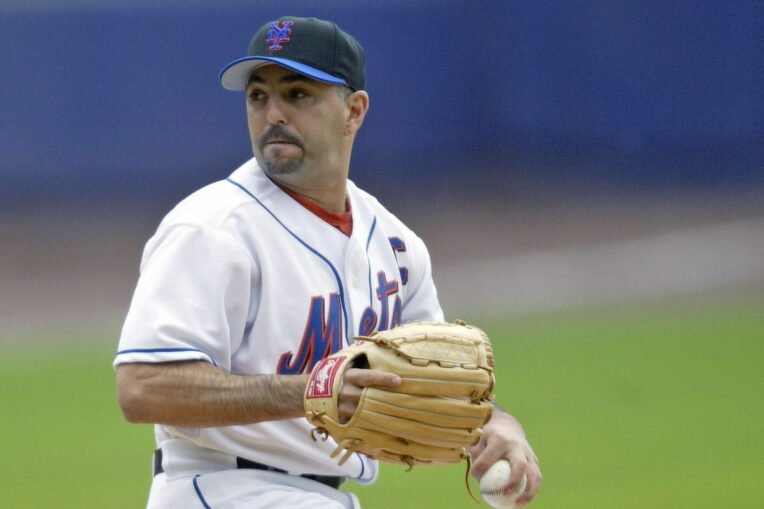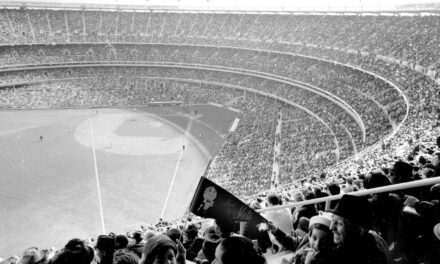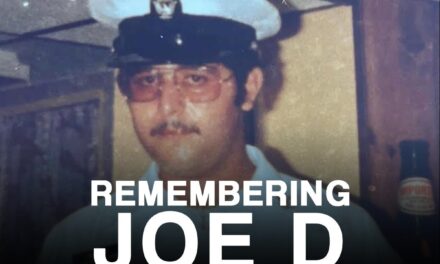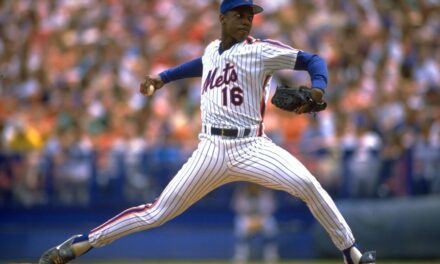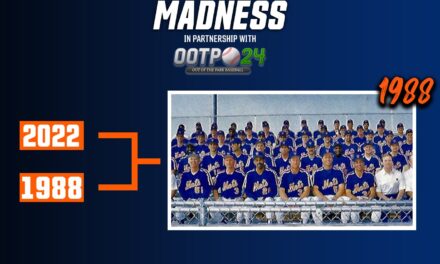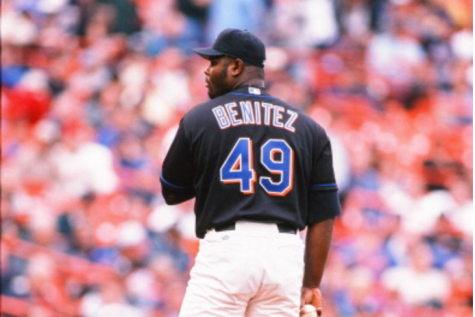
With the start of summer came more meltdowns.
Entering their series with the Phillies and a homestand of almost two weeks, the Mets had found themselves leading in each of their last 15 straight contests — yet found a way to lose six of them.
That streak would continue long into this temporary Shea residency, but the initial two games versus Philadelphia exposed New York’s latest weakness: the bullpen.
The first to sear under the heat was Armando Benitez, who’d been enjoying a streak of his own. His 17 consecutive scoreless innings was abruptly ended by the bat of rookie Pat Burrell.
The No. 1 overall pick in 1998 out of Miami led off the top of the ninth with a homer to deep right field to tie the opener at two apiece and spoil seven innings of brilliance from Mike Hampton.
The Phillies would score the deciding run in the tenth to hand Benitez (who threw 32 pitches over two innings) the dubious honor of both a blown save and a loss.
Burrell wasn’t done haunting the Mets that week, a tactic he’d revive again and again throughout his career in Philadelphia.
The following night, facing Al Leiter in the sixth, Burrell sent an inside pitch over the left field fence to put the Phils ahead.
They tacked on another before the Mets struck back with two — only setting the stage for ninth-inning misery.
Benitez’s heavy workload the night before initially kept manager Bobby Valentine from using his closer, leaving John Franco out there when he wasn’t at his best.
Franco allowed the Phillies to load the bases before yielding a walk. Valentine then made a decision he’d admittedly regret, bringing in a tired Benitez to face the newest Met killer.
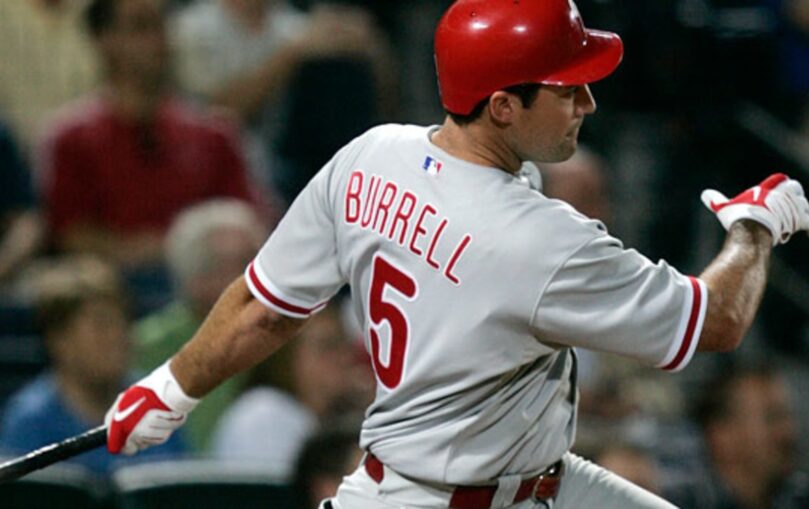
Burrell’s first career grand slam, this one into the left-center-field bleachers, sewed up what would be a 10-5 decision — helping to give Philadelphia, a club occupying the NL East cellar, a boost against a far superior opponent.
Meanwhile, the Mets were squandering their opportunity to keep pace with the first-place Braves. And if not for Jay Payton (and an assist from Bobby Abreu), New York might’ve been swept.
Payton’s sixth-inning drive deep to right field deflected off Abreu’s glove and over the fence as he crashed into the wall trying to make the grab.
The Mets, through good fortune, were ahead for the first time. That lead stretched it to 5-2, then the bullpen tried to give it away again.
Turk Wendell escaped an eighth inning in which he allowed a homer, uncorked a wild pitch, issued a walk, overcame a passed ball, a Robin Ventura error, and survived a fly ball that was chased down by Joe McEwing in left field.
Philadelphia turned the McEwing catch into a sacrifice fly, but would score no more.
The Mets breathed a sigh of relief then went on to blow away the Pittsburgh Pirates. But the biggest breath of fresh air came from the return of Bobby Jones.
After two starts with Triple-A Norfolk to adjust his delivery and improve his curveball, Jones quickly showed the benefits of that humbling demotion.
He pitched eight strong innings, allowed five hits and one run while striking out eight. He received plenty of support from the offense, too. Especially in the third inning, when New York tacked nine on the board to fortify a 12-2 win.
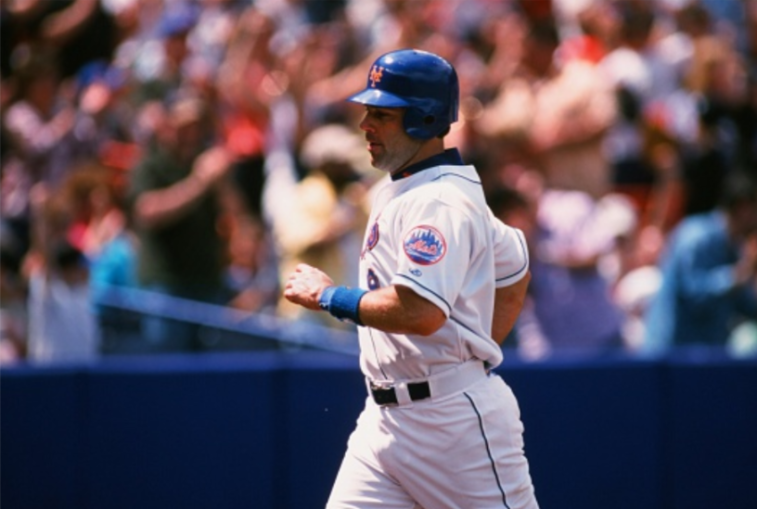
Pittsburgh’s chances for victory improved greatly the next day. But a lead that grew to as much as 8-4 proved to not be so secure.
The Mets tallied three in the seventh and three more in the eighth — capped by Todd Zeile‘s two-out, two-RBI double.
Robin Ventura also blasted a pair of homers — his 15th and 16th of the season.
Mike Hampton kept runs to a minimum in the series finale — for the Pirates, at least. The Mets, though, were not finished feasting on Pirate pitching.
While Hampton allowed only five hits and improved his record over his last nine starts to 5-1 with a 1.60 ERA, New York held a 1-0 lead until they broke the game open in the sixth.
A walk and a sac fly brought in two, then five hits produced an additional five runs in the seventh.
Melvin Mora tacked on a solo homer in the eighth to finish off the 9-0 win as Hampton went the distance.
Of even more significance was the fact that the Mets had overcome a recent stretch of five losses in eight games by winning four straight to put them within three games of Atlanta.
It wasn’t a coincidence that the Mets’ hot streak aligned nicely with the success of their most important player.
Mike Piazza was delivering run-producing hits at the opportune moments.
So much so that by late June, he was putting together an impressive string of consecutive games with an RBI (in addition to a 14-game hitting streak).
After the sweep of the Pirates, that mark had reached nine straight — closing in (but still far away) from of the all-time MLB record of 17.


